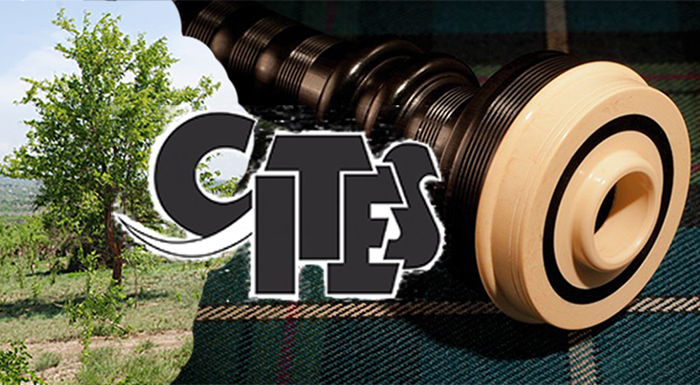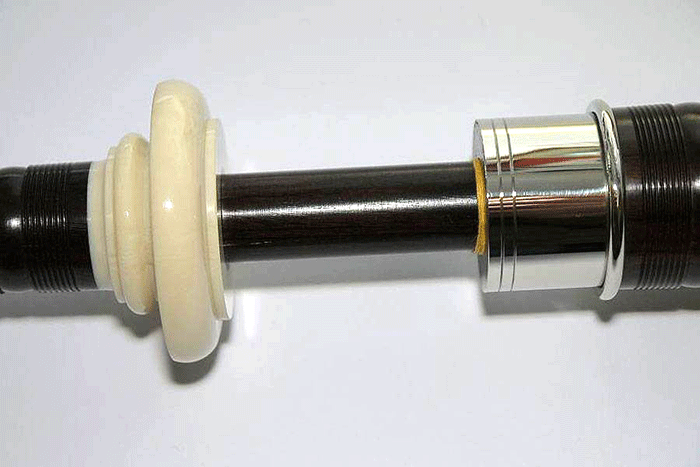
Stricter measures in the trade in elephant ivory come into force in Canada today, January 8, 2024. The new rules could have implications for all pipers with ivory pipes.
Henceforth the Canadian government will only permit the import and export of raw elephant ivory destined for a museum, zoo, use in scientific research or in law enforcement activities, writes the Editor.
Furthermore, and this is the relevant part for pipers with ivory pipes, permits will be required for all imports and exports in worked elephant ivory, including for items traded as personal effects.
Pipers travelling to Canada with, say, a UK Musical Instrument CITES Certificate, will need to obtain an additional Canadian certificate to enter Canada with their pipes.
Clearly the new rules are an additional concern for many pipers, pipe makers and dealers in older bagpipes. And remember, although you may not be travelling directly to Canada, a major piping and pipe band hub, you could be diverted through, or delayed in, that country.
The Canadian regulations have been drawn up under guidance from CITES, the Convention on International Trade in Endangered Species of Wild Fauna and Flora.
Further information here. Contact the Canadian authorities at: cites@ec.gc.ca.
Current Position in the UK
Here in the UK there are criminal offences associated with moving or trading ‘CITES-controlled specimens’ (in our case ivory pipes) if you do not have a valid permit or certificate. The maximum penalty is a seven year prison sentence and an unlimited fine.
You must apply for a permit or certificate to import, export or re-export ivory pipes. This includes if you are selling between Great Britain (England, Scotland and Wales) and the European Union, and between Great Britain and Northern Ireland.
Unless they/you have the correct CITES documentation, you should not buy, ship or travel with ivory pipes. If travelling you’ll need to use a designated point of entry or exit and if asked, show your CITES documents to Border Force and customs officials. If you’re travelling with your instrument as part of a pipe band each ivory set needs to have a CITES permit. This permit is free.
Our advice to all home-based pipers is not to travel with ivory pipes. Buy a ‘travel set’ of art ivory or blackwood and nickel. Excellent sets are made at reasonable prices by the manufacturers who advertise with Piping Press.
Those in the UK with older sets of pre-1918 silver and ivory or full ivory pipes can apply for a CITES exemption certificate if they believe their pipes are of ‘outstandingly high artistic, cultural or historical value’. Applications cost £250 but this is non-refundable should your application fail.
The regulations state: ‘You need to demonstrate that your item was made or existed before 1918 and has outstanding artistic, cultural or historical value.
‘This exemption is designed to be narrow and apply only to those items that are significant to wider society. It does not consider any personal, sentimental or financial value that may be attached to an item.

‘You cannot deal (buy, sell or hire) in items containing or made of elephant ivory under the Ivory Act 2018, unless they are registered under a standard exemption certified as a pre-1918 item of outstandingly high artistic, cultural or historical value.’
Whether your set is rare will likely depend on the estimated number of similar sets that exist, including how many are in the UK, how unique its artistic or aesthetic quality, its condition as a pristine example of its type, or if it is associated with a particular historical event or person.
For example anyone with an old set that belonged to John MacDonald, Inverness, or Pipe Major Donald MacLeod, or a set with a plaque that states it was presented to an Army pipe major by a Sovereign, may have a good case here.
The regulations state that each item is assessed by ‘recognised experts’ from a prescribed institution who will advise the Animal and Plant Health Agency (APHA) on whether an exemption certificate should be granted. Who would these experts be in the piping world? A long established pipe maker? Someone at the Piping Centre, the Army School?
The regulations add: ‘It is expected that a very high threshold will be set to decide whether an item meets these criteria. If any given information is not accurate, the applicant or owner could be subject to a fine of up to £250,000 or five years’ imprisonment.’
If you own ivory pipes made after 1918 there is no need for a CITES certificate so long as you don’t plan to travel with them. And you can:
- keep them for personal use
- give them away as a gift
- leave them to someone in your will
- lend them out free of charge
You cannot sell or hire out any ivory you own that has not been registered or certified under any circumstances. If you’re involved in arranging or facilitating an illegal sale, purchase or hire, you will be committing an offence under the Ivory Act 2018. More information is available here.
- We would be grateful for further information on ivory pipes relevant to the US and EU. Please comment below.

















I like elephants and am glad they’re valued and protected. But a word made immortal by a bloke named Connolly rings loudly.